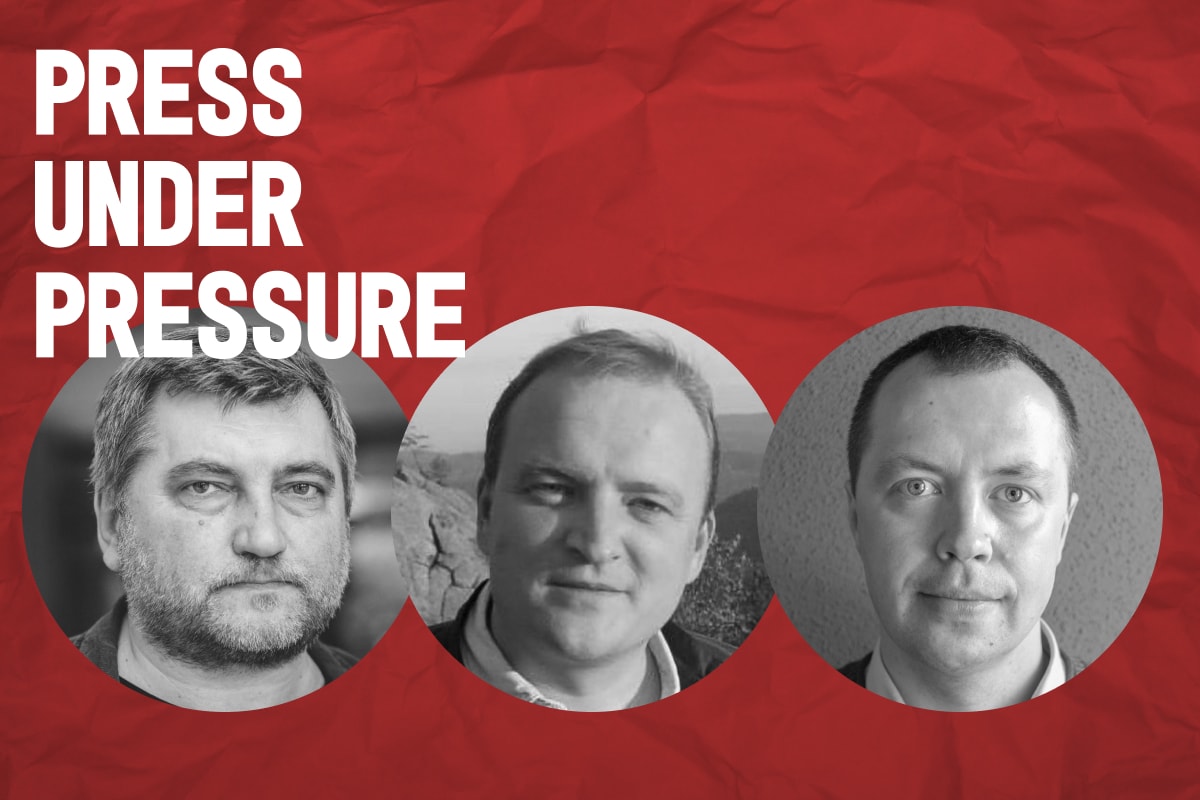
The BAJ office in Minsk is sealed, the bank account blocked, and office equipment, financial documents and the corporate seal have been seized.
The BAJ Chairman Andrei Bastunets and his deputies Aleh Aheyeu and Barys Haretski told us about the searches and what actions the Association intends to take.

At about seven in the morning on February 16, my deputy, the BAJ press secretary rang me and said they were breaking into his flat. Right after that I contacted my colleagues, Oleg Ageev among them. Oleg did not pick up the phone and later I saw a message saying they had come to him as well. Everything was completely clear. I watched through the window as three figures dressed in black approached my entrance hallway. Soon the doorbell rang.
I took my time before I opened the door: I got dressed and collected my things. I was sure I would not be coming back home. Three men entered, introduced themselves as officers of the Main Internal Affairs Directorate of Minsk City Executive Committee and suggested we proceed to the BAJ office for a search. My flat was not searched. But it is possible that this story will continue.
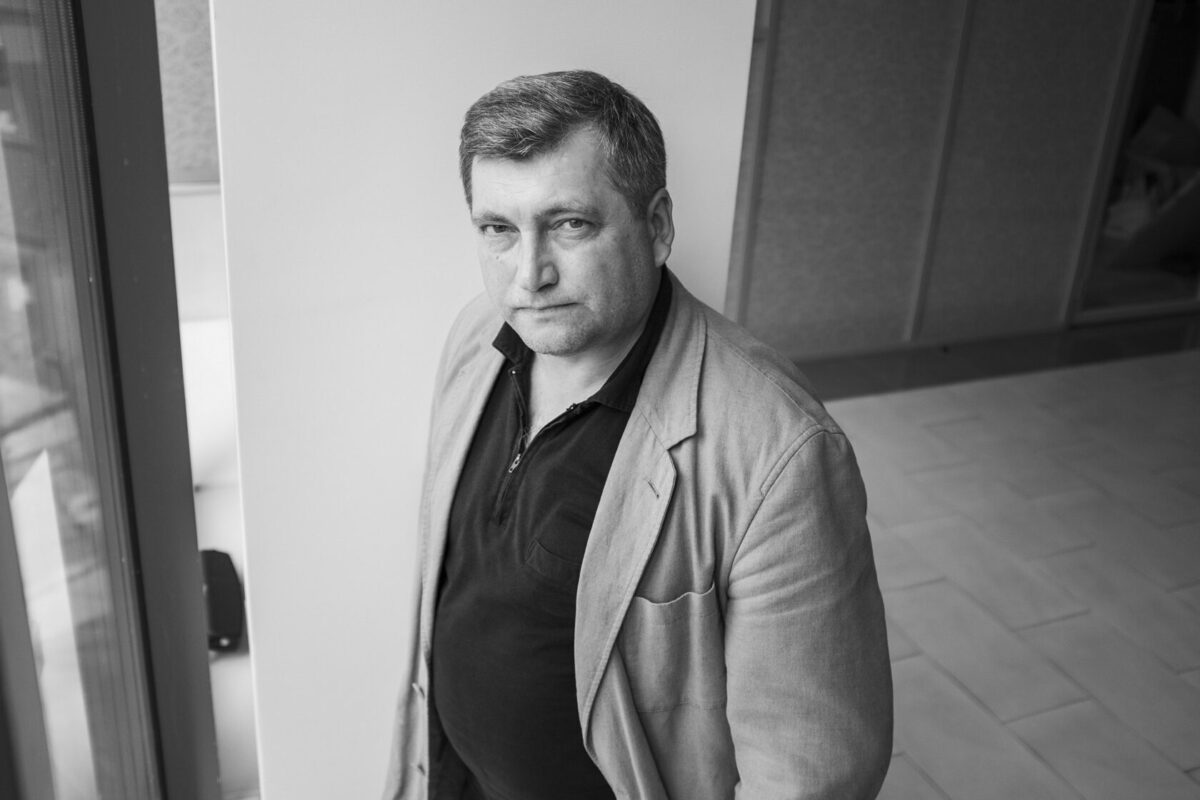
Andrei Bastunets. Photo: Press Club Belarus
We arrived at the office. Within several hours they had inspected everything quite thoroughly. Several laptops were seized, phones, folders with the lists of association members, accounting documents, a safe with our corporate seal, water receipts worth nine Belarusian roubles and 23 Belarusian roubles cash. They also seized ‘Abajur’ magazines published by the BAJ. The cover of the latest issue featured photographs from the protests in white and red colours [Belarusian opposition colours — Ed.]. At the end, they sealed off the office.
At present we have no access to our office, our corporate seal, or accounting documents. Our current account is blocked.
In other words, everything has been done to paralyse the activities of the association.
However, if that was the purpose of the searches, they failed. First, BAJ employees have for a long time been working remotely because of the pandemic, without need to come to the office. Second, we will continue our work anyway: we will defend the rights of our fellow journalists and support independent journalism in the country – especially now, when it is suffering such unprecedented pressure.
During the search of the office, police officers were very much worried about the number of people gathered in the corridor, especially journalists. The officers rang their superiors to get advice about what to do next.
Later, when I gave a brief interview to the journalists on site, I found out that the flat my son lives in had also been searched. They had even come to him first: at seven in the morning, when they smashed down the doors and broke into the flat. Eight men, in full kit, with assault rifles. They forced my son down on the floor and shouted at him. Footage of this was later shown in the MIA materials. As a result of this search all the electronic equipment in the flat was seized.
It was a complete surprise to me because the flat is my wife’s property and my son has no relation to either the BAJ’s activities, or to mine.
Unfortunately, I am sure that pressure on the press, media organisations and on Belarusian Association of Journalists activists will only increase. On February 16, the police raided 90 addresses of human rights defenders, journalists and trade union representatives. Things were seized at each of the addresses: computers, phones, documents.
I assume the Investigative Committee, which sanctioned these searches, is now in shock because they need to sort out all these items. They are examining them now, looking for any leads. It is possible criminal prosecution of all the subjects of the searches will follow. We all – who had searches conducted on February 16 – still don’t know our procedural status.
Since the Belarusian authorities have already crossed the Rubicon and they have no regard for the position of the USA, the European Union, or other democratic and professional communities in respect of current events, I forecast even harsher measures. It can reverse in a while, of course; the usual bargaining can start. It is even possible that the situation will improve – the economic crisis could force an improvement. Yet in the short-term perspective, I see no signs of positive changes.
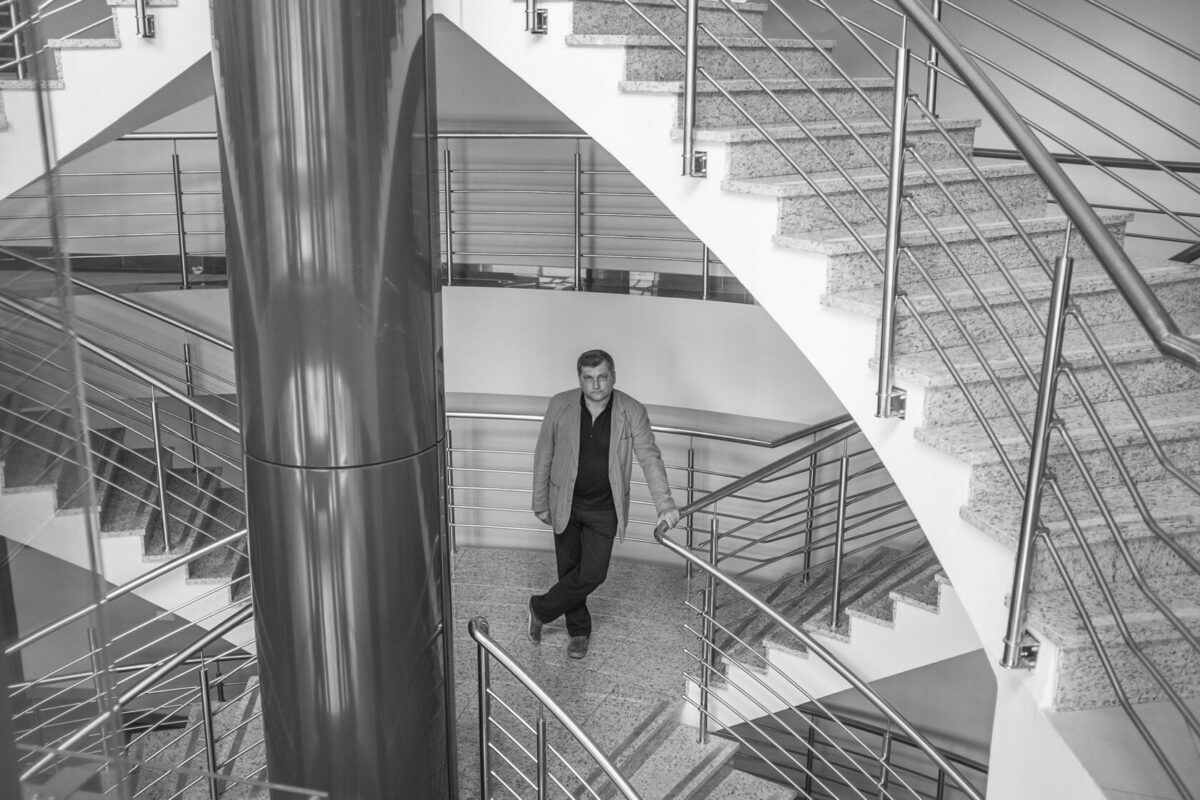
Andrei Bastunets. Photo: Press Club Belarus
We all live in the expectation that they will come to us one day. And it can happen any day. Every morning I wake up and I wait for the doorbell to ring, for someone to be breaking my door down. Long-term plans are excluded in such circumstances.
I have no plans to leave the country and I’m ready to be detained. We have discussed our plan of action in various situations and created an anti-crisis office. We will also try and continue our trips to outlying regions to meet our colleagues who suffer the pressure of the authorities just like we do.
The Belarusian Association of Journalists was created in response to the violation of the rights of journalists in our country. These violations are now unprecedented. It is a challenge for us and we will do our best to fulfill our main task – to support and protect journalists working in Belarus.

At seven in the morning on February 16, some men started ringing the door of my flat, knocking loudly and demanding, «Police! Open the door!» I heard the voice of my neighbour among the men’s voices. I rang her and asked what was happening. She said that there was a police crowd at my door and they had a saw ready to break my door down. When I heard the sound of the saw being switched on I understood I’d better let them in to avoid the additional problem of a broken door.
Five men stormed into the flat, but without violence. Two young men – witnesses – silently followed them. One of the security officers was dressed in black with no insignia, wearing an armoured vest and was armed; another one wore civilian clothes. Three other were armed with hand guns and they produced documents: one employee of the Main Directorate for Drugs Control and Combating Human Trafficking of the MIA of Belarus, one from the Main Directorate of Criminal Investigation of the MIA of Belarus, one from the Criminal Investigation Department of the Main Directorate of Internal Affairs of Minsk City Executive Committee.
While familiarising myself with the documents, I noticed a peculiar thing: the search was being conducted on February 16 while the order for it had been issued on February 1, and sanctioned by the Deputy General Prosecutor the same day. That is, it had taken them two weeks to prepare for such a large-scale action.
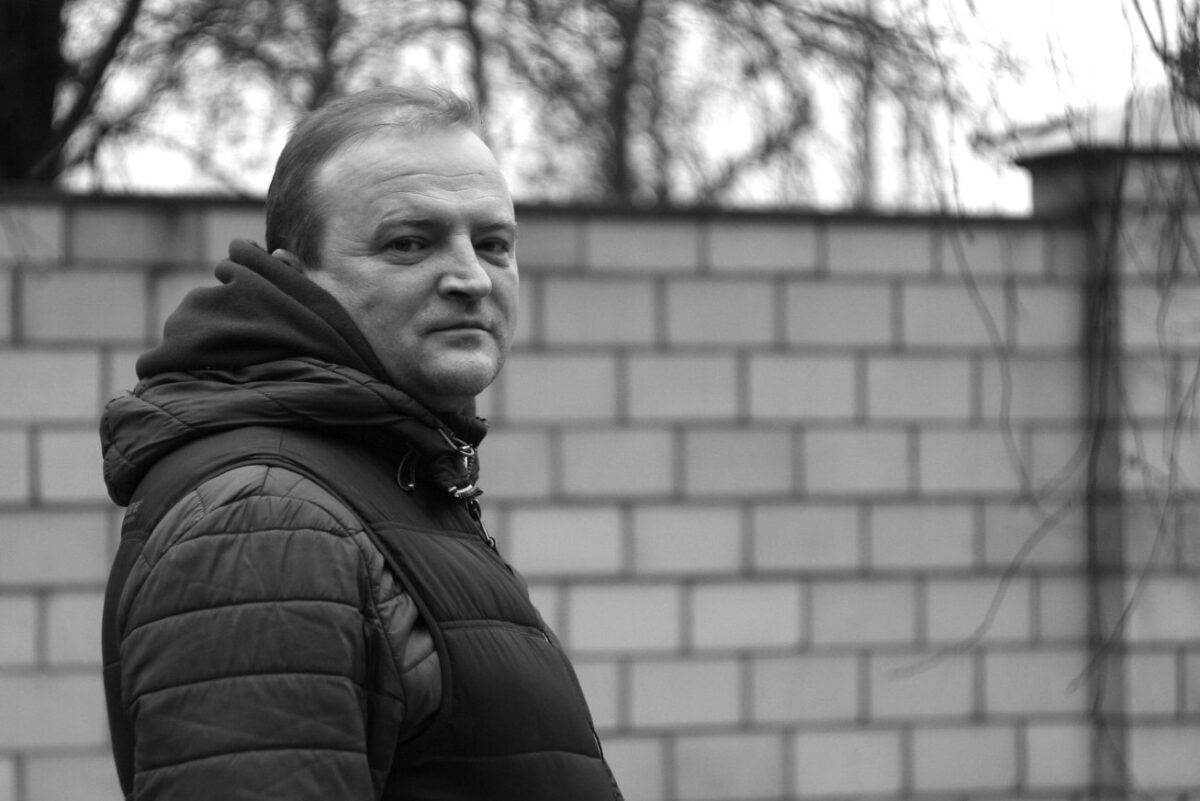
Aleh Aheyeu. Photo: humanrights.org
The MIA later reported they had conducted 90 searches across the country. The order for the search was almost blank: just that an investigator of such and such investigative directorate reviewed the criminal case (number stated) opened under Article 342 of the Criminal Code and ordered a search at my place of residence (address stated).
I have to admit, the officers were polite enough. Any disputes during the search were related to the appropriateness of the protocol.They disagreed with some of my demands, and denied some of my requests.
I have seen many searches and this particular one lacked the usual crudeness on the part of the security officers.
Yet it was a full shakedown. They moved and turned over the furniture, pulled out things in the middle of the room. They checked every pocket in all items of clothing, all corners, shelves and the ceiling storage. The search took a total of five hours without breaks: they arrived at seven in the morning and left at 12. Bear in mind, I only have a one-room flat.
A search protocol had 38 items of property seized. The MIA officers seized all the cash found in the flat: they only left about 100 roubles in my wallet. They also seized all laptops, external hard drives, flash drives, two hard disk drives from my old computer (it has Windows-98 installed on it, I think). They only left a printer and a TV set. They took four flags, two of which were the state flags of Ukraine and Poland.
I asked what crime one could possibly commit using the state flag of, say, Poland: but they did not answer.
They seized three notebooks with handwritten notes, a lot of business cards: of Belarusian and foreign lawyers, international organisations employees – the UN, Council of Europe, OSCE, embassies. They also took letters I had received from political prisoners and my personal correspondence with them, which seemed odd to me. Another important thing: my BAJ accreditations were seized, even old ones which had expired. They took my power of attorney authorising me to represent the Belarusian Association of Journalists and membership of other organisations. As well as several legal documents for the cases of journalists I legally represented.
But despite all the searches and the BAJ’s activities being paralysed, we continue our work. I want to thank everyone who offered to help immediately, and provided equipment to replace the seized ones. We work remotely and hope to return to our normal state soon.
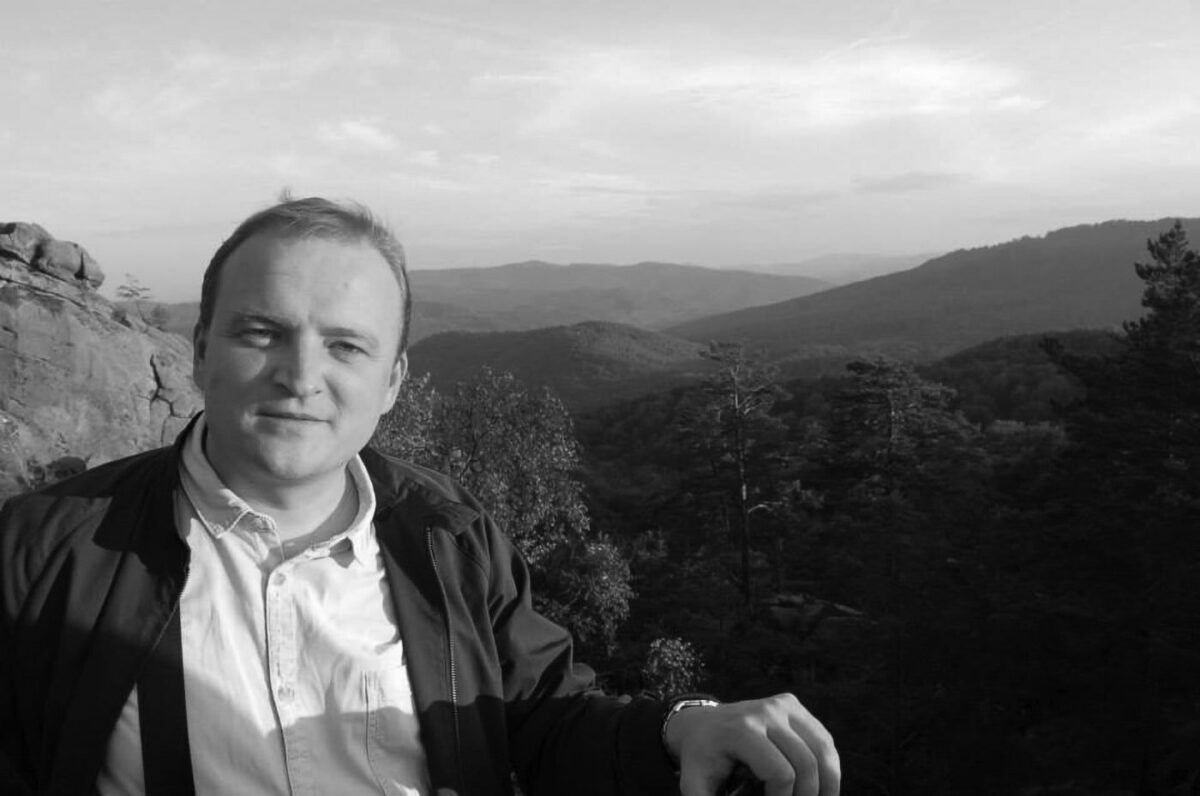
Aleh Aheyeu. Photo by Barys Haretski
In fact, almost all Belarusian citizens – not only journalists – have lost their main right: a defence by a competent governmental body, as required by international law. The obligation of the courts, prosecution offices, police and other relevant structures – the obligation to protect human rights – has been expressly rejected. Should a breach take place though a governmental agent’s fault, the state will openly protect the governmental officer.
In my experience, none of the legal documents were satisfied in the last six months: some were not even evaluated properly. In response to statements on opening criminal cases short formal notes are given – often in breach of all procedures and procedural legislation – making one single thing clear: we will not open a case, and you can take it or leave it.
And this is a serious challenge because the state has a significant amount of obligations before society and the individual within the «state–society–individual» system of relations.
In our country, the state has unilaterally stopped protecting the rights of individuals and is no longer acting in the public interest.
That is why the number of applications to international legal mechanisms has grown. And the possibility has appeared to use the legal mechanisms of foreign states regarding crimes against humanity. There are already criminal cases opened for such crimes committed and being committed in Belarus since last August. In other words, crimes against humanity are recognized as crimes under international law; and therefore any country can open corresponding criminal cases in its territory with its law enforcement agencies. Such investigations under universal jurisdiction have been initiated in Poland, Lithuania and Ukraine.
But in the near term, unfortunately, the rights of many people, especially journalists, human rights defenders, civil activists and political opposition actors will be violated, and their safety will be threatened.
Regarding the BAJ’s activities, we plan to have a meeting with lawyers helping journalists: we’ll try and develop general approaches to acting under these challenging conditions.
This is not the first time we have faced such a situation in 26 years of working under the current political system in Belarus.
But this is the first time human rights are being violated on such a scale and with such cynicism.
However, the experience of the past years has revealed itself. The current events rather provoke sarcasm: «it has never happened, yet here it goes again». The thing is to stay cheerful and do what we are good at; and what we must do.

On the morning of February 16, we were getting ready for school and for work. Around seven in the morning, I saw a gray Polo parked at the entrance hallway and two men in black masks near it. At 7.20 they started ringing the intercom, then the doorbell and it was clear this was serious. Our fears had come true.
But I still managed to ring my colleagues within 10 to 20 minutes and warn them about what was happening. A search was already underway at Oleg Ageev’s. I also noticed a group of security officers with a saw and rushed to the door shouting not to cut it and that I have three children. I opened the door and raised my hands showing I was unarmed. To prevent violence.

Barys Haretski. Photo: Press Club Belarus
They entered the flat. It was obvious they were wound up: they had been forced to spend some time at the landing seen by my neighbours. At first, they clearly wanted to show who was the boss: like, hands behind your back, head down. But they were likely stopped by three children present in the flat. The situation was defused; they showed me a document as they entered, made me sign it and let the special force unit – in camouflage and armed – leave.
Only the MIA officers remained to conduct the search on behalf of the Investigative Committee. They started to walk slowly around the rooms one by one and inspected each corner thoroughly.
They even looked in the bathroom, toilet, kitchen. They looked into coffee and tea tins, into the fridge and freezer.
They took all the clothes – even children’s – from all the shelves and ceiling storage and examined it thoroughly, searched all pockets. They searched the whole flat in such a manner.
The whole process took about three and a half hours. Eventually, they seized mobile phones, two laptops,and all the flash drives they could find. They also took our children’s phones, which was most traumatising for the children. It made all three of them cry.
They also took two white-red-white flags from us. By the way, the witnesses were some students living in a BSU [Belarus State University] dormitory in 10A Oktyabrskaya St. They might be future investigators and prosecutors. They watched me very closely when the white-red-white flag was revealed by the MIA officers. Perhaps, they were expecting me to get upset, start talking…
The operatives also took books. They flipped through all the volumes on the bookshelf. They were interested in works by Radio Svaboda, Uladzimir Arlou, Uladzimir Niakliaeu, Pavel Seviarynec.
To be honest, I was ready to be detained. Already while they were ringing the doorbell, I had put on warm clothes without a belt. I did not exclude the possibility that they would take me for a questioning and then to the detention centre in Valadarskaha.
But at some point, the officers said, «We will not detain you. If you’re needed, we’ll summon you.»
And they packed all the things they had seized and left.
The search was conducted by the order of the Investigative Committee in a criminal case under Article 342 (Organisation of group actions causing serious harm to social stability). It said things and items related to the criminal case could be kept at my home. They left me a copy of the search protocol that included a list of the property seized.
I want to make it plain that it is absurd to suspect the BAJ of organising mass riots or actions. The association has been registered in Belarus and all our activities are public. We always submit reports to the various governmental institutions as required. Besides, we always underline our neutrality and disinterest in politics. Our task is to protect journalists. It is stated in our charter, which has been registered with the Ministry of Justice, and we follow it strictly.

Barys Haretski. Photo: Press Club Belarus
Since our office has been sealed, and equipment, and a safe with our corporate seal and documents have been seized, our work now is complicated. Our colleagues helped us with equipment, but we are trying to use it minimally – there is the possibility of new searches and seizures.
And I am worried about the plants locked in the sealed office. Who will water them?
I would like to recommend to all my colleagues: be as open as possible, do not confront the security officers. Did they come to search you? Alright, let them take your things. Try to get prepared in advance for it both physically and psychologically.
If you fear they might come, conduct a «rehearsal» search yourself. Look at your place with the eyes of investigators. Check what you keep where. If there is anything of value, are you ready to lose it?
Given that they took a list of BAJ members and the applications to join the BAJ from our office, it is possible they will summon more people for a talk. But one should not fear it because the BAJ’s activities and membership of the association are absolutely legal.
I would also recommend thinking about who to ring and their respective phone numbers, including the number of a lawyer. If you don’t have an agreement with a lawyer in force yet, it would be good to make an arrangement with one you know to start representing you ahead of when it is required: and share his/her details with your family.
My most important advice is to stay calm. We are not in breach of anything here. The law will prevail, sooner or later.
On 27 August, 2021 the Supreme Court sustained the claim of the Ministry of Justice to liquidate the Belarusian Association of Journalists. The Court recognized all the BAJ representative’s arguments to the contrary as immaterial.
Terms and conditions
Partial or full reprint is permitted subject to following terms of use.
An active direct hyperlink to the original publication is required. The link must be placed in the header of the reprinted material, in the lead or the first paragraph.
Reprints, whether in full or in part, must not make changes to the text, titles, or copyrighted photographs.
When reprinting materials from this page, attribution must be given to the Press Club Belarus “Press under Pressure” project, collecting evidence of repression against independent media and journalists in Belarus.